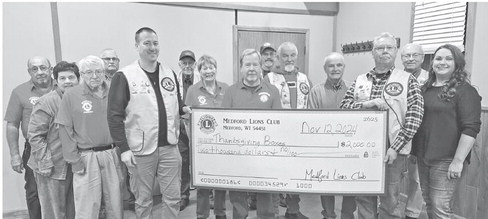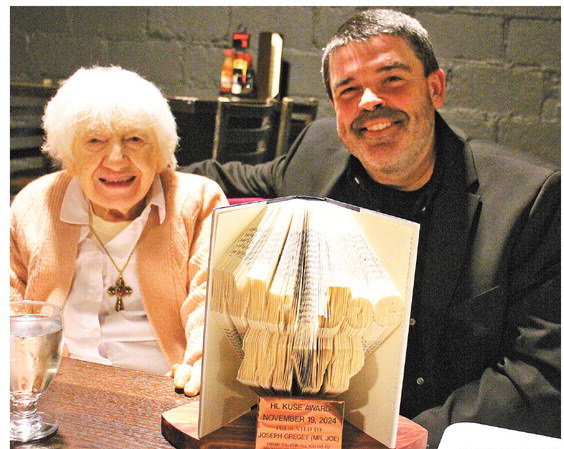County discusses impact of Verso shutdown
The Taylor County Forestry Committee at its meeting on Monday discussed the financial impact the shutdown of the Verso paper mill in Wisconsin Rapids will have on the county forest.
Forestry administrator Jake Walcisak said the closing of Verso’s mills in Wisconsin Rapids and Duluth, Minn. has had a huge impact on northern Wisconsin, noting the facilities used 800,000 tons of pulpwood per year. He said contractors logging in the Taylor County forest send 4 percent of all its timber sale value and 5 percent of all its timber sale volume, as well as 10 percent of all its mixed hardwood pulp, to the mill in Wisconsin Rapids.
Walcisak said in the second quarter, timber sales revenue has been very stagnant with sales to date being just over $311,000. “We had a record breaking first quarter with about a record losing second quarter.” He said sales were just $5,000 short of reaching the department’s budgeted revenue goal and anticipated they would reach that goal, but noted if the trend continues the forestry department would likely finish the year $75,000 below its five-year average in timber sales revenue.
Committee member Mike Bub said he was worried prices would go down because there would be too much product and not enough buyers. Walcisak agreed, saying if the county loses its markets, it will adversely effect the county’s ability to sustainable manage its forest. He said while there are several other paper mills in the area, they’re not taking any additional wood at this time.
Committee member Gene Knoll asked how much of what the county harvests each year is saw logs and how much is hardwood pulp. Walcisak said it varies, but generally 50 percent of the timber harvested in Taylor County is hardwood pulp. He said while only 10 percent of that wood was hauled to Verso, that fact that half of the timber harvested is hardwood pulp is very concerning to him.
Walcisak said in order to keep local contractors going the committee will have to look at making modifications and implementing temporary measurers such as extending contracts beyond four years, reducing stumpage fees and so on.
Bub agreed the county needs to be more proactive to help out its contractors in the long term. He said if new markets emerge and there aren’t any loggers, that’s going to hurt the county and the health of the forest in the long run.
Walcisak said he agreed with Bub that the county needs to do something to help lessen that string and asked at what point does the county subsidize that work force to maintain their productivity and sustainable forests locally. “At what point do we flex our policy and absorb a financial loss to do our part to keep the contracts in business?”
Bub said he didn’t think it would be a financial loss, but a reduction in income because the county would still be making money. “The choice you make long-term here is do you sacrifice a little bit of income to maintain a sustainable long-term future.”
“Or do we hold off on a sale we thought we should have to give the market some chance to recover if that’s possible?” asked Knoll.
Walcisak said the county does have some flexibility. He said the county was bound by statute and administrative code to offer a timber harvest annually, which is 500 acres a year, but it does have some latitude on which acres and the types of timber offered for sale.
Walcisak said Taylor County has historically been insulated from the effects of down turns in the timber market. He said the county sets its minimum bids the lowest of any county in the area and the market has responded by adjusting for it. “I don’t really think a minimum being too low is a concern because in the end competitive bidding is going to come out competitive in the end.” He said there have been market down turns in the past — citing mills closing in Brokaw, Port Edwards and Park Falls — which didn’t have a huge or long-term effect. Walcisak said while minimum bids statewide will probably be cut in half this summer and fall, he expects Taylor County will have to cut its minimum bids by around 30 percent from where they are now.
Knoll asked if the county could renegotiate the contracts. Walcisak said as a public entity, the county would have to do it for all its contracts. He said some counties are implementing a cut across the board while other are offering a cut on just hardwood pulp.
Committee member Myron Brooks was in favor of a 15 percent cut across the board. Member Gary Beadles was against it, pointing out the market for saw timber was still strong and not affected by the Verso shutdown.
“I think we should wait and not be in a hurry,” Beadles said. He said from talk on the street and from reliable sources, he believes that once Verso gets rid of the union in Wisconsin Rapids, someone else is going to starting making paper there again. Beadles added he believes that China was and still is interested in purchasing the Wisconsin Rapids plant. “I believe that by freeze up this winter, they’re going to be making paper there and that once they get the word out they’re taking wood, the loggers will fill that yard up in two weeks. We need to be ready to help the loggers out to survive, but we just need to wait, be calm and see what all plays out.”
Walcisak said that was the biggest message coming out from what committee members were saying. “This is not something we need to solve today. This is not something we need to solve next month. But when some of the contracts we have active right now come due in a year and a half or two years, if things don’t rebound, we’re going to be facing this.”
“I think the important part of todays discussion is that we recognize there is a problem and that we’re going to monitor it,” said Knoll. “We’re not going to make any fast decisions, but I guess if any of those loggers that are nervous, I think we can tell them we’re watching what is going on and we understand that the market changes and that we’re willing to react to that.”


